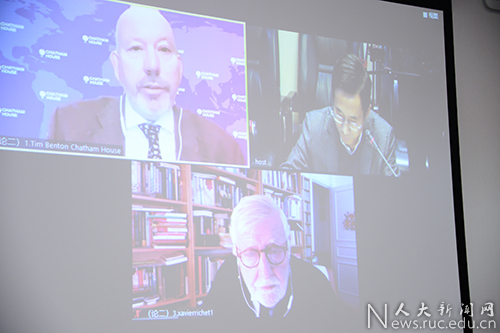 Research Update
Research Update
10
Dec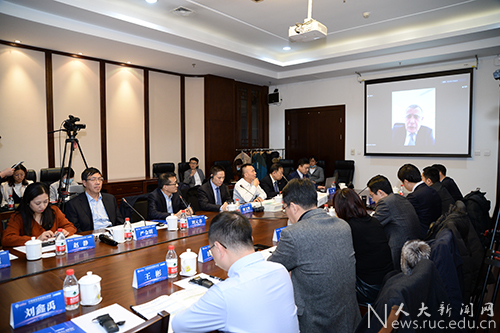
On December 12, the China-EU Green Development Forum 2020 was held in RenminUniversity of China (RUC), which is organized by the National Academy of Development and Strategy (NADS) and the School of International Studies, RUC, co-organized by the National Academy of Belt and Road Green Development (NABRGD), CICEC and supported by Ifeng.com. The forum is one of the celebrations for the 70th anniversary of the School of International Studies, RUC, and a warming-up activity for China as the host country of the 15thConference of the Parties (COP15) on Convention on Biology Diversity (CBD) in 2021.
Mr. Liu Yuanchun, Vice President of RUC, made the welcome address and H.E. Nicolas Chapuis, Ambassador of the European Union to China, delivered the opening remarks.
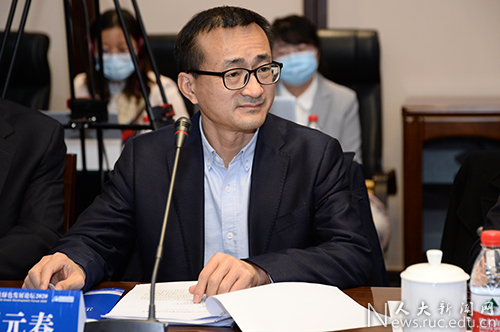
Liu Yuanchun said that green development is a significant strategic choice decided upon the development stage, environment and change of conditions of China, which is in essence, the inevitable trend of adaption to the changes unseen in a century, and accelerating adjustment of high-quality domestic development towards a new stage. China and the EU are highly complementary in green development and response to climate change with considerable cooperation potentials. Both sides should make full use of the mutually complementary advantages of technology, manufacturing and capital, seek sustainable economic development through green cooperation, advance industrial transitions in China and EU, and jointly address the global challenges of environment and climate change. He hoped that through more communication and interaction, both sidescould explore the common issues of mankind and conduct cooperation more proactively so as to further demonstrate the leadership of China and EU, advance multilateral process, promote global sustainable development, provide references to the economic transitions of more developing economies, and contribute both Chinese and European wisdom and solutions to the construction of a community of shared future for mankind.

H.E. Nicolas Chapuis said he is so pleased to attend the forum. Green development is a topic of utmost importance that both the EU and China should execute relevant plans to realize carbon neutrality by 2060. EU’s Green New Deal is deemed as a very important development strategy that gives top priorities to environment, economy and social sustainable development. Hence green development will be the focus of the future. He added that the EU and China have numerous opportunities for cooperation on biodiversity, and the future enhancement between the EU and China will of great significance to global food security, human wellbeing, economic growth and social stability. EU will continue to call on the world for even greater commitments on climate change. He was convinced that the EU and China will enhance cooperation in the fields such as response to climate change. The target of a more sustainable future can be achieved through joint action.

The moderator of the opening ceremony was Mr. Yan Jinming, Executive Dean of the National Academy of Development and Strategy, RUC.
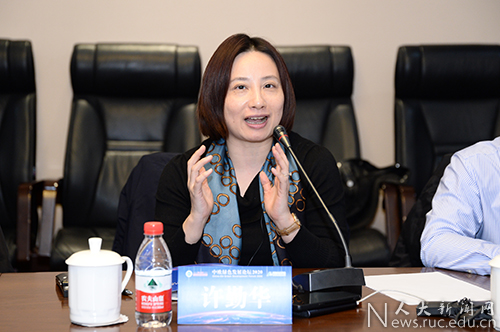
The forum is planned and organized by Ms. Xu Qinhua, Vice Dean of the National Academy of Development and Strategy, RUC. More than 50 guests from 40 Chinese and European organizations attended the forum and made presentations. The agenda includes opening remarks and keynote speeches and was then divided into two sessions of youth roundtables and closed-door seminars where the former was broadcasted by Ifeng.com on December 4.
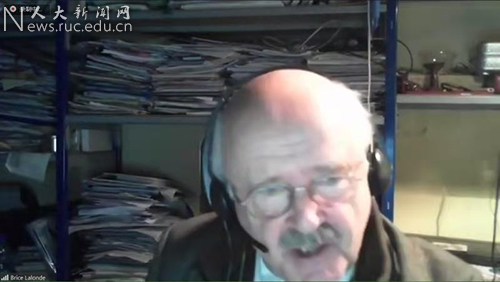
The keynote speakers included Mr. Brice Lalonde, Former French Minister for the Environment and Chair of the Business and Climate Summit, and Mr. Li Junfeng, First Director and Chairman of Academic Committee of National Center for Climate Change Strategy and International Cooperation (NCSC), and Executive Member of the Council of China Energy Research Society.
Mr. Brice Lalonde introduced several key technology pathways of carbon neutrality under a close partnership between China and the EU. First is the decarbonization including carbon capture and storage (CCS) and artificial photosynthesis, e.g. CCS to produce hydrogen for sustainable fuels that promotes green development of aviation sector; second is the transmutation of nuclear waste that turns the existing nuclear waste into the elements with shorter half-life or stable elements; third is the laser under research that the laser beam is used to simulate the reactor for the effect of transmutation, which however has some difficulty so far.
Liu Junfeng said that China's goals of carbon peaking by 2030 and carbon neutrality by 2060 demonstrate a more determined and active attitude of China towards green transition. Still, of course, we should be fully aware of the opportunities and challenges of China in the path of carbon neutrality. EU's technical and policy measures, including the actions of people and enterprises, all provide important and positive reference for China in formulating the technical roadmap, action plan and policy measures for carbon neutrality after 2030. Chinese enterprises are expected to understand the general trend of green and low-carbon transition and continue innovation while the macro policies can be further optimized to encourage the unity of the whole country and international cooperation in a concrete manner. He believed the road of China to achieve carbon neutrality could be thorny but with a promising future.
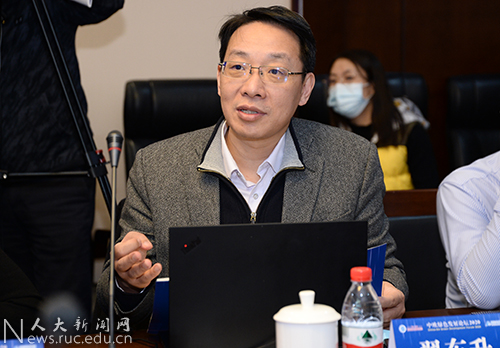
The session of keynote speeches was presided over by Mr. Di Dongsheng, Vice Dean of School of International Studies, RUC.
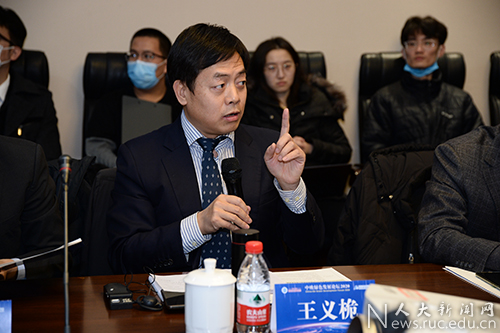
The Group A of China-EU Youth Roundtable on Green Development was themed with "China-EU Youth Sharing View: Way to Green Recovery", presided over by Professor Wang Yiwei at School of International Studies, RUC, Dean of Center for European Studies at RUC. The session was attended by 6 China and EU youth delegates and 2 student delegates to discuss from different perspectives. They were Chai Qimin, Associate Research Fellow and Director of Department of Strategic Planning, National Center for Climate Change Strategy and International Cooperation (NCSC), Ben McWilliams, Research Assistant at Bruegel, Xiang Junyong, Acting Director of Economic and Technology Research Institute, Global Energy Interconnection Development and Cooperation Organization (GEIDCO), Cristian Stroia, Research Fellow in Energy, Resources and Climate Change, Center for European Policy Studies (CEPS), Brussels, Cheng Lin, Deputy Director of Research Center for Green Finance Development at PBC School of Finance of Tsinghua University, Wang Bin, Associate Professor, School of Economics, Jinan University and Ph.D. Candidate Wang Wanfa and Master Candidate David C. Ramirez from School of International Studies, RUC.
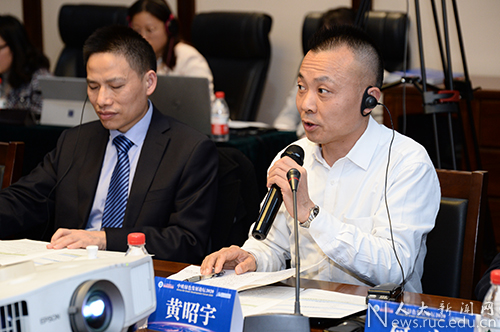
The Group B of Youth Roundtable was themed with "Challenges and Opportunities: Building Sino-European Green Development Youth Cooperation Partnership" and presided over by Huang Zhaoyu, Research Professsor, China Institutes of Contemporary International Relations and Associate Editor of Contemporary International Relations.
The session was attended by 6 China and EU youth delegates and 3 student delegates to discuss from different perspectives. They were Jiang Lizhang, Founder of Hope Group, Patrick Schröder, Senior Research Fellow in the Energy, Environment and Resources Programme at Chatham House, Wang Zixing, Researcher of General Management Department of SINOPEC Group and Member of Belt and Road Research Team, Sergei Belokonev, Academic Supervisor of the Faculty of Social Sciences and Mass Communications, Financial University under the Government of the Russian Federation, Xue Bing, Senior Research Fellow at the Technische University Berlin, Zhao Jing, Chief of Teaching Reformation and Development Section, Teaching Affairs Department, Civil Aviation University of China (CAUC), and the student delegates of Ph.D. Candidate Wang Peng, Ph.D. Candidate Chen Chao and Master Candidate Anton Lövgren.
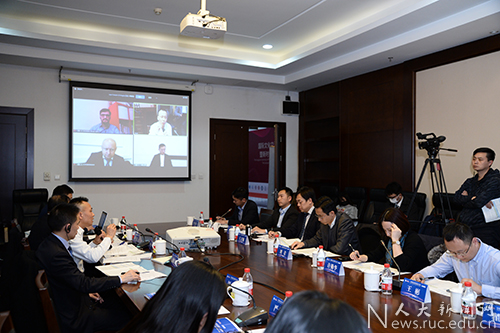
The closed-door seminar A was themed with "China-Europe Cooperation in Post-COVID-19 Era: Boosting Innovation and Industrial Cooperation for Green Development", and presided over by Yue Xiaoyong, Former Ambassador and Senior Research Fellow at National Academy of Development and Strategy, RUC.
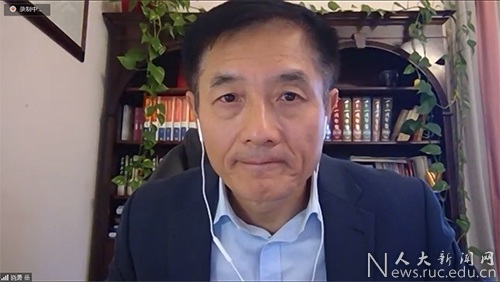
The session was attended by five panelists, including Wang Zhijia, Member of the Council of the UN Association of China and Former Director-General of International Cooperation Department, State Environmental Protection Administration of China (SEPA), Dr. GrischaBeier, Research Group Leader for Digitalization & Sustainability at Institute for Advanced Sustainability Studies Potsdam, Germany, XieYuhong, Vice Chairman and Secretary-General of All-China Environment Federation (ACEF), Tim Summers, Assistant Professor of Center for China Studies, The Chinese University of Hong Kong and Senior Fellow, Asia-Pacific Programme, Chatham House, and Sven Grimm, Head of Research Programme on "Inter- and Transnational Cooperation" at the German Development Institute (DIE) in Bonn, Germany and Extraordinary Professor of Stellenbosch University, South Africa.

The seminar B was themed with "China and EU Carbon Neutrality Vision: Opportunities and Challenges" and presided over by Liu Qing, Vice Dean of National Academy of Development and Strategy, RUC.
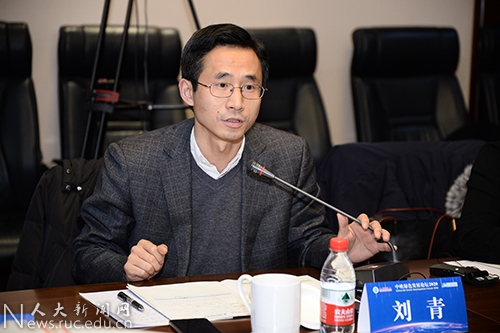
The session was attended by six Chinese and European panelists including Tim Benton, Research Director of Emerging Risks Research Programme and Director Energy, Environment and Resources Programme at Chatham House, Dr. He Hong, Chief Delegate of Hemlholtze Association of German Research Centers in Beijing, Xavier RICHET, Jean Monnet Chair Professor at the University Sorbonne Nouvelle, Pan Haixiao, Professor and Ph.D. Supervisor of Department of Urban Planning, Tongji University, Chuanrong Wang, Project Director of Application European de Technologies et de Services (AETS), France, and Matthias Ballweg, Head of the Mobility Department at SYSTEMIQ Ltd.
